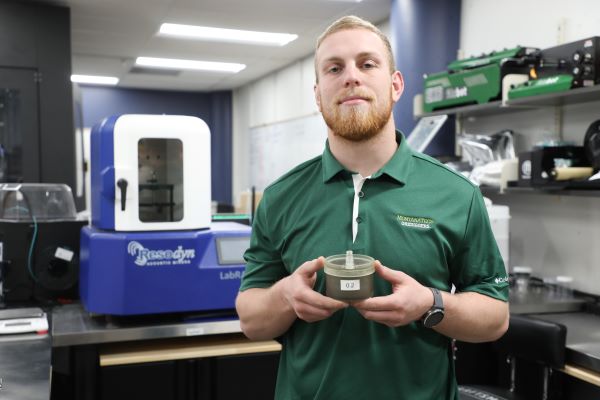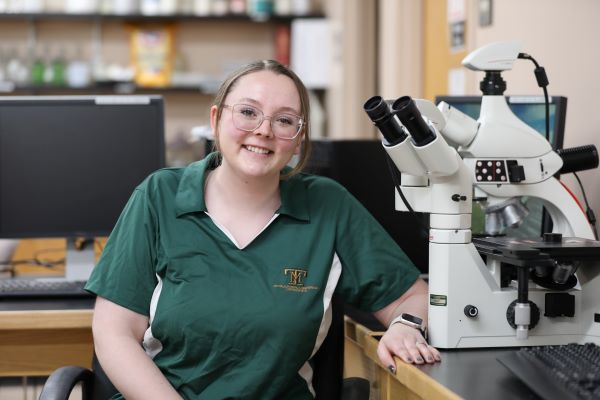5th year master’s programs offer students career advancement opportunities, while saving time and money

Traditionally, a master’s degree in engineering requires two additional years of study beyond a bachelor’s program, but a student and alumna say the Lance College of Mines and Engineering’s 5th year Master’s Program at Montana Tech has allowed them to advance their careers and conduct ground-breaking research into topics that matter, while saving time and money.
Jeff Guthrie (B.S. Mechanical Engineering, 2024), from Spring Creek, Nevada, says he considered athletics and cost-savings when making a college choice for his undergraduate experience.
“I was supposed to go to the College of Idaho on a football scholarship, but it was still going to be pricey,” Guthrie said.
Guthrie found it would be more affordable at Montana Tech, and he walked onto the football team. For two years, Guthrie excelled on and off the field.
“Football was getting tougher to handle,” Guthrie said. “I had torn my knee. Dr. Peter Lucon asked me one day in class ‘Have you thought about grad school?’ I never thought I would pursue graduate school before.”
When Lucon proposed that Guthrie complete the 5th year, and tailor his studies around a project that would investigate the effects of vessel geometry on resonant acoustic mixing, Guthrie could not pass it up.
Dr. Lucon considered Guthrie to be a good candidate for this program since “Guthrie is an outstanding student in class. He is eager to learn and do new things on his own and also has a great attitude.”
He and Dr. Lucon planned carefully in his junior and senior years of undergraduate study to work in graduate courses that would count toward the 5th year master’s.
“It is meticulous,” Guthrie said. “I had to think about everything ahead of time. I got really good at planning. I made many lists and talked to people throughout the year to help plan. It’s not for everyone. It’s very difficult to cram all of that into your junior and senior year. You have to do your experiments on an accelerated timetable, but as long as you have the right people around you, you’ll be successful.”
Graduate classes are also a lot different than undergraduate ones.
“There’s more literature to go through,” Guthrie said. “You have to read more and understand other people’s thoughts and convey your own thoughts more so than you do in an undergraduate class. There are more projects, more discussion, more research involved.”
Guthrie completed the bachelor’s portion of the programming in May 2024, and he’s expected to graduate in May 2025 with his Master of Science in General Engineering. During his undergraduate years, he participated in football, SAE Baja Club, Fly Fishing Club and the Montana Tech Chapter of the American Society of Mechanical Engineers (ASME). He also was a Prospector, a student ambassador who gives tours of campus.
Guthrie counts the campus community as one of the highlights of his time at Montana Tech.
“When I give tours, I like to talk about how nice the people are,” Guthrie said. “People in Montana are super kind.”
Overall, Guthrie thinks the experience will be worth it.
“I think the challenge appealed to me,” Guthrie said. “Both of my parents have master’s degrees, so deep down, I knew I wanted to get a master’s degree, too.”
He hopes to get an engineering job after graduation with enough flexibility to pursue interests outside of work.
“I think I might enjoy doing something like coaching football,” Guthrie said.

For Baylie Phillips, a Butte native, (Metallurgical and Materials Engineering, B.S., 2023; Materials Science and Engineering, M.S., 2024), the 5th year master’s program is just a stepping stone further into academia. She’s headed to the University of Washington to pursue a Ph.D. in Materials Science and Engineering to specialize in biomaterials, having focused her research on coatings that could be applied to vascular stents deployed in the human heart.
“Tentatively, I would like to go into the cardiology field to make stents for the cardiovascular system with lower failure rates,” Phillips said.
When she received one during her junior year, Phillips learned that stents had a significant failure rate. Her stent crimped, and Phillips had to undergo a second procedure to replace it.
“I saw where this is a problem, and did a deep dive into the field. I realized I had the potential to study and work on fixing it,” Phillips said.
In April it was announced that Phillips earned the National Science Foundation Graduate Research Fellowship, a five-year award with three years of financial support with an annual stipend of $37,000 to continue her research. The National Science Foundation makes the awards to ensure the quality, vitality, and diversity of the scientific and engineering workforce of the United States.
She also received the Achievement Rewards for College Scientists (ARCS) from the ARCS Foundation Seattle Chapter, an unrestricted gift of $22,500, dispersed over three years. The awards were the coda to a successful academic journey flush with numerous accolades. She was a finalist for the Rhodes Scholarship in 2022, and was awarded the 2022 Barry M. Goldwater Scholarship, which is the most prestigious undergraduate scholarship awarded in the natural sciences, mathematics, and engineering in America. She was also recognized as a Local Hero in December for her many contributions to Montana Tech and the wider Butte community.
The 5th year master’s was critical to Phillips earning both degrees so she could advance to the Ph.D. program.
“It’s an extremely efficient system,” Phillips said. “I decided I was going to do the 4+1 accelerated program as a sophomore. I realized I really liked materials engineering, and knew I would get my Ph.D. You have a better chance of getting into a Ph.D program with a master’s degree.”
Phillips’ advisor Dr. Jerry Downey helped her set everything up to be as efficient as possible.
“It helps if you have undergrad research experience,” Phillips said. “I cannot imagine going into the masters without any research experience. You are on your own for a lot of it. The amount of self-sufficiency you have to have doesn’t get talked about a lot. If you didn’t read textbooks as an undergrad, it would seem like a lot of reading. It’s a huge change.”
Phillips said she felt well-prepared, though.
“When touring universities to learn more about potential Ph.D. programs, I was confident I was prepared,” Phillips said. “I would do the 4+1 100 times over.”